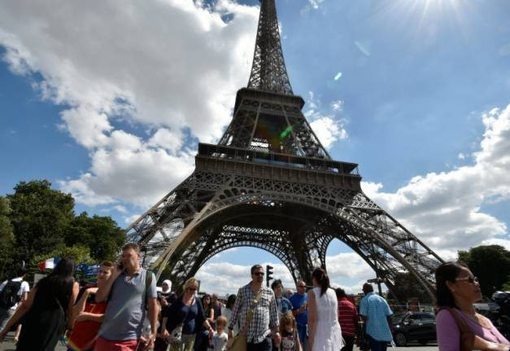AFP
Benjamin Fitzgerald
Jan 17, 2018
Global tourism hits record increase in 2017, France leads
AFP
Benjamin Fitzgerald
Jan 17, 2018
Global tourism in 2017 recorded the best annual result in seven years, thanks to an economic comeback with Europe in the lead and terrorism-plagued nations returning to popularity in the last twelve months. The United States, however, remained stagnant.

The year "2017 recorded the strongest growth since 2010," with an increase of 7% in the number of tourists across the globe, compared to 2016, explained the secretary general of the World Tourism Organisation (UNWTO) on Monday, at a press conference in Madrid.
For several years, the rate has sat around 4%. With the acceleration, the number of international visitors (those spending at least one night in one place) reached 1.3 billion people across the globe.
The UNWTO attributed the surge "to the economy recovery" seen globally, which has encouraged western tourists and emerging market countries to travel more. Brazilians and Russians have, for example, have increased spending in this area, "after several years of decline."
Europe, and in particular, the Mediterranean, was the most attractive continent for visitors, up 8%. Looking at the region alone, in which the UNWTO also includes Turkey, the area welcomed close to half of all tourists (671 million).
Travellers also seemed to look beyond safety fears ignited by the terrorism attacks, which has adversely affected number for the last two to three years. Meanwhile, in France, "the trend is clearly positive (+8%) after two years of decrease, linked to terrorist attacks" in the country, and "everything indicates" that France was the most top global destination in 2017, despite definitive numbers not being published until spring," explained markets manager, UNWTO, John Kester.
According France's foreign affairs minister, the number of visitors to France in 2017 could reach 89 million.
Spain outpaces the United States
Zurab Pololikashvili also underlined Spain's "big success," where arrivals grew 9% even though Catalonia, the most visited region, experienced an attack in August (killing 16 people), as well as autumn protests provoked by the political independence crisis.
"We estimated that Spain will become the second global destinations for travellers" in 2017, before the U.S., which will not release official figures until June," added UNWTO secretary general, Zurab Pololikashvili, predicting also a "quite good" result for Catalonia in 2018.
Spain welcomed 82 million visitors last year, compared to 75.6 million in 2016, according to the Spanish government.
The U.S., the second most popular tourist destination in 2016 with 75.6 million visitors, on the other hand, recorded a "decline", according to the UNWTO, without giving official yearly figures or an explication on the contributing factors. Between January and June, tourist levels dropped 4%, the UNTWO specified.
In the first half of the year, the US-based Global Business Travel Association (GBTA) estimated that the U.S. economy could lose $1.6 billion (€1.3 billion) in 2017, due to uncertainties likely to discourage business travellers, blaming the anti-immigration stance of President Donald Trump and the ban on boarding a plane with a laptop from some airports, which lifted in July.
In 2017, North America recorded the worst regional result with an estimated increase of 2%, despite "good results from Mexico and Canada."
For 2018, UNWTO expects 4-5% growth in the number of tourists worldwide. Tourism accounts for 10% of global GDP and employs one in ten people on the planet (including indirect jobs), according to UNWTO.
Copyright © 2024 AFP. All rights reserved. All information displayed in this section (dispatches, photographs, logos) are protected by intellectual property rights owned by Agence France-Presse. As a consequence you may not copy, reproduce, modify, transmit, publish, display or in any way commercially exploit any of the contents of this section without the prior written consent of Agence France-Presses.

























